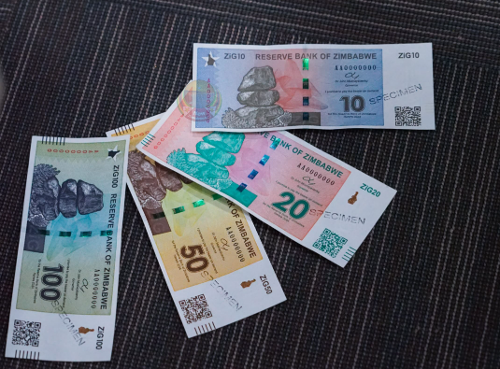Zimbabwe’s ZiG shift has quashed a more than 330 per cent Zimbabwe Stock Exchange (ZSE) surge this year, leaving investors grappling with the consequences, Bloomberg reported.
ZiG, backed by gold, replaced the Zimbabwean dollar, which had already depreciated by 80 per cent this year. Moreover, since the ZiG debut, the ZSE All Share Index has fallen by 99.95 per cent, short for Zimbabwe Gold, on April 5.
The trading volume and transaction value have also sharply declined as share prices transitioned from the old currency to the new.
According to Bloomberg, investors flocked to stocks as a safe space amid the local dollar’s decline and soaring inflation, reaching a seven-month high of 55.3 per cent in March.
Notably, the stock exchange provides one of the few avenues for investment in the southern African nation to hedge against exchange-rate instability and inflation. However, a surge in stock prices often signals impending currency turmoil rather than celebration.
Justin Bgoni, the chief executive officer of the bourse, attributed the exchange’s poor performance to various factors, including the prolonged period for the nation’s banks to switch from Zimbabwean dollars to ZiG and tight market liquidity.
“Generally, people are also hesitant and don’t understand what the value is in ZiG terms, Bgoni remarked on Monday via phone.
The stock exchange converted share prices at a rate of 1 ZiG to 2,498 Zimbabwean dollars following a central bank directive on April 5 mandating ZiG as the new transaction currency for bank accounts and supermarket prices.
Trading volume decreases have caused a revenue drop of at least 50 per cent for some brokerages, with many facing significant earnings setbacks, as per Lloyd Mlotshwa, head of research at IH Securities in Harare.
Stockbrokers in the area describe the situation as a “painful early winter” marked by low trading activity.
They anticipate adverse effects on the entire stock market ecosystem, including custodians, government revenues, and the Zimbabwe Stock Exchange (ZSE), which collects fees and commissions.
With 80 per cent of transactions in dollars, the ZSE’s decision to trade in ZiG poses a significant challenge for stockbrokers, says Enock Rukarwa of FBC Securities.
Imara Asset Management, managing $100 million in assets, predicts potential upheaval in the coming month as ZiG share prices remain unstable.
Moreover, Imara’s CEO and CIO, John Legat and Shelton Sibanda, suggest it would have been wiser for the ZSE to switch to US dollars, aligning with the Victoria Falls Stock Exchange, given that many listed businesses report and pay dividends in US dollars.


